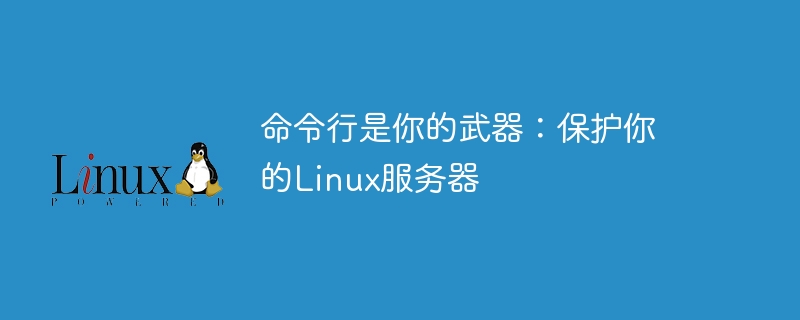Home >Operation and Maintenance >Linux Operation and Maintenance >The command line is your weapon: Protect your Linux server
The command line is your weapon: Protect your Linux server
- 王林Original
- 2023-09-11 08:15:111272browse

The command line is your weapon: protect your Linux server
With the rapid development of Internet technology, Linux servers have become an important cornerstone of the online world. However, various network security threats are also increasing. To protect your Linux server from attacks and intrusions and become a powerful system administrator, the command line is one of your most important weapons.
The command line (Command Line Interface, CLI for short) is a way to interact with the computer by inputting instructions on the keyboard. Compared with GUI (Graphical User Interface, graphical user interface), the command line is more efficient and flexible, allowing you to understand and control your Linux system more deeply.
First of all, the command line can help you create a more secure login method. Through the SSH (Secure Shell) protocol, you can remotely log in to the Linux server through the command line. Compared with the traditional telnet login method, SSH uses password encryption and public key encryption mechanisms, which greatly reduces the risk of being attacked by hackers.
Secondly, the command line provides a series of tools and commands that can help you monitor and defend against malicious behaviors. By using command line tools such as top, netstat, tcpdump, etc., you can monitor the server's resource usage, network connection status, and network traffic in real time. The output results of these tools can help you detect abnormal behaviors in time and take appropriate measures to prevent malicious attacks and intrusions.
In addition, the command line also provides some powerful security features, such as firewalls and intrusion detection systems (IDS). Through the iptables command, you can configure a powerful firewall to control network connections in and out of the server. Through intrusion detection systems such as Snort, you can monitor network traffic in real time and detect and prevent intrusions in a timely manner.
In addition to security features, the command line also provides various management tools to help you manage users, access rights, and file systems. With command line tools such as useradd, chmod, and chown, you can easily create and manage users, set access permissions, and protect important files and directories from unauthorized access.
Finally, the command line can also help you analyze and audit system logs. The Linux system records various system events and operation logs and saves them in the /var/log directory. With command line tools like grep and tail, you can find specific log entries, analyze system behavior, and track down potential security issues.
Although the command line provides many powerful and flexible functions, it also requires you to have certain skills and experience. In order to fully utilize the security potential of the command line, you need to learn and understand how to use various commands and tools, as well as the principles behind them.
In short, the command line is an important weapon to protect your Linux server. By using the command line, you can establish a more secure login method, monitor and defend against malicious behavior, configure powerful security features, manage users and access rights, analyze system logs, etc. By continuously learning and mastering the knowledge and skills of the command line, you will become a powerful system administrator and protect your Linux server from attacks and intrusions.
The above is the detailed content of The command line is your weapon: Protect your Linux server. For more information, please follow other related articles on the PHP Chinese website!

